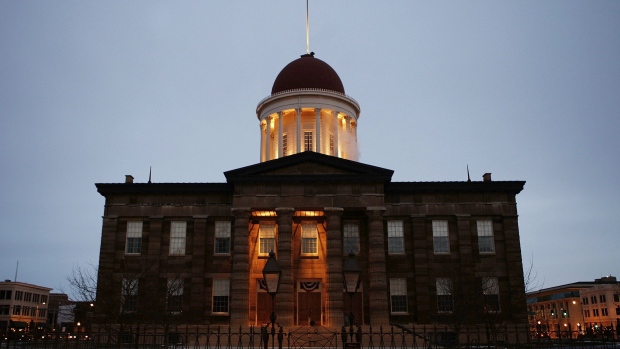Aug 5, 2022
Illinois Wins End to 50-Year Court Oversight of State Employment
, Bloomberg News

(Bloomberg) -- A federal appeals court in Chicago ended five decades of oversight of Illinois government employment practices, citing the state’s progress in addressing its “embarrassing history” of political patronage and corruption.
The decision Friday closes out one of the so-called Shakman consent decrees dating back to 1972, which placed Illinois under court oversight to curb the practice of tying state jobs to political loyalty. But Governor J.B. Pritzker had sought to ditch the oversight, arguing the state had adopted robust reforms to prevent abuse.
While a state inspector general report in 2014 identified violations of the decree between 2003 and 2013, Illinois has since “moved in a new direction,” making meaningful progress in identifying and preventing political patronage, the 7th US Circuit Court of Appeals said. The state hasn’t had any major violations for years, and the oversight has lasted long enough, the panel concluded.
“In no way are we saying that the risk of unlawful political patronage no longer exists within Illinois,” Circuit Judge Michael Scudder wrote in the court’s opinion. “Of course it does: nobody is naive to the state’s embarrassing history.” He added, “But allowing risk-driven reasoning to carry the day creates a most-concerning risk of its own -- that the decree remains in place indefinitely.”
Illinois has a long track record of corruption. Four of the past 11 governors went to prison, including Rod Blagojevich, who was convicted in 2011, five years after his predecessor, George Ryan, was found guilty in a licenses for bribes scandal. In March, federal prosecutors indicted Michael Madigan, the Illinois House speaker and longtime power broker, on racketeering, fraud and bribery charges.
Shakman Lawsuit
The case against the state began in 1969 when political candidate Michael Shakman and voter Paul Lurie filed a class-action lawsuit challenging a patronage system in state and local government that rewarded political loyalty and connections with jobs. The appeals court said six federal district judges had presided over the litigation and more than 1,000 reports had been filed since the consent decrees first took effect in 1972.
The city of Chicago won release from oversight in 2014. But a federal judge last year denied Pritzer’s effort to end the consent decree covering his office and state agencies, finding they hadn’t done enough to fully carry out a new set of employment policies and hadn’t shown that reforms would prevent politically motivated abuses going forward.
Scudder wrote that the district judge set the bar too high, focusing on “administrative best practices” as opposed to whether there were ongoing constitutional violations that made judicial supervision necessary. The appeals court concluded that the state had come up with “durable remedies” that satisfied the goals of the consent degree, while also noting that the legal system would remain “open and receptive” to future claims that politics were improperly driving state employment decisions.
“We cannot let perfect be the enemy of the constitutionally adequate,” said Scudder, who was joined in the opinion by Circuit Judge Frank Easterbrook. Former Circuit Judge Michael Kanne also heard the case when it was argued in December, but he died in June.
Pritzker said in a statement that he was “gratified that the court recognized my commitment to hiring practices that fully live up to the principles of the US and Illinois Constitution.”
Shakman said in a phone interview Friday that he hadn’t decided whether to petition the full 7th Circuit to reconsider the case. He said that although the consent decree dated back to 1972, the scandals of the Blagojevich era that led to an expansion of the court’s oversight were more recent.
He also questioned the court’s suggestion that individuals could file patronage claims going forward, saying that a current state government employee “is going to think long and hard” before bringing a case against their boss or coworkers.
(Updates with comment from lawyer)
©2022 Bloomberg L.P.








